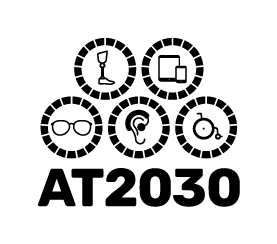“Without mobile phones, we would be in darkness.” Collected through our digital access gap research in Kenya and Bangladesh with our partner Altai, this quote from an older man with hearing impairment living in rural Kenya summarises well why we do what we do. As we build the Assistive Tech programme to drive digital inclusion for all, we have been busy over the summer collecting evidence and individual stories and connecting with the stakeholders who will help us in our mission. Here we look at some of the highlights from the past months and what is coming next.
Discussing inclusive innovation in Rwanda
During M360 Africa in July Bernard Chiira, who leads Innovate Now in Nairobi, announced the call for applications for the Inaugural Cohort for Africa’s 1st Assistive Technology accelerator and explained the large untapped potential of AT innovation in Africa. In a follow-up discussion I had with Bernard and John Warnes from UNHCR working with refugees with disabilities, we touched upon the themes of affordability and availability of AT solutions and how global supply chains could be better leveraged to improve access to AT, how important user centred & inclusive design is to ensure no one is left behind, and the need for creative business cases in the private sector. In Rwanda, where expanding access to internet is a priority, I had the chance to meet Rene William Ngabo, the president of Rwanda Assistive Technology Access (RATA), an NGO with the mission of ensuring accessible ICTs for persons with disabilities (PWDs) across the country. Rene explained with passion his mission to train but also place trained people in internships to facilitate their integration in the labour market (the employment-to-population ratio of persons with disabilities aged 15 and older is almost half that of persons without disabilities).
Collecting Insights from the field in Kenya and Bangladesh and the GReAT Conference
Thanks to the support from the Global Disability Innovation Hub (GDI) and the programme AT2030, we are currently collating the results from our digital access research in Kenya and Bangladesh, giving us unique insights into the ownership, access and use of mobile phones and services by persons with disabilities. In a session with our partners GDI, the UK Department for International Development (DFID), and an expert from Leonard Cheshire, these early learnings reinforce the impression that mobile is increasingly a lifeline in places where institutional services are limited. However, persons with disabilities are still less likely to own and access a mobile phone than a non-disabled individual in their country, or more likely to use lower-end phones and not benefit from the accessibility features offered by higher-end smartphones. The results for Kenya were presented in collaboration with the GDI Hub in Geneva in August at the WHO GReAT Consultation, a global gathering of public and private stakeholders preparing the next Global Report to highlight the current need, demand and supply of assistive technology, as well as outlining good practices for innovation and recommendations to improve access. Full results will be published later this year.
Engaging with mobile operators and preparing our side session in Kuala Lumpur
It is also a crucial time for us to engage and work with mobile operators on the question of inclusiveness in their business, and for their customers. Disability inclusion champions begin to emerge: for example, Safaricom in Kenya continues to develop their voice biometric platform to enable customers with visual impairments to access M-Pesa services; or Zain which recently outlined their inclusive disability strategy WeAble , building the foundations for a more inclusive digital ecosystem. To further our engagement with mobile operators and other stakeholders, next week on 25 September, we are hosting a first dedicated assistive technology workshop during the M360 Digital Societies conference in Kuala Lumpur.
In this session on “How people with disabilities can represent an untapped market for mobile operators in emerging markets”, mobile operators such as Singtel will share more about their accessibility and inclusiveness strategy, and we will foster a discussion on industry recommendations for effective strategies for driving inclusion of PWDs across all services and products within the mobile & digital ecosystem. Please do get in touch if you are interested to learn more or attend.
We are looking forward to making progress in our mission and sharing individual stories on how mobile technology is an important connector and enabler as an Assistive Technology.



